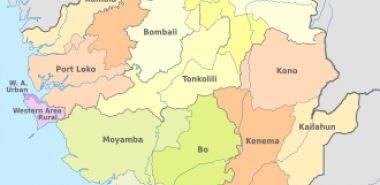RELATIONS WITH THE EU
The European Union and Sierra Leone
The EU and Sierra Leone have built a strong partnership, based on shared values. The EU has been supporting Sierra Leone in the consolidation of peace, democracy and development with a positive impact, delivering benefits for the Sierra Leonean people.
In Focus
Political Relations
|
The European Union is a longstanding and committed partner of Sierra Leone. The EU and Sierra Leone have built a strong partnership, a partnership of equals, based on shared values. We have been supporting Sierra Leone in the consolidation of peace, stability and democracy (including electoral support), governance, human rights, fundamental freedoms, gender equality, inclusive economic growth and development, sustainable management of natural resources and environmental protection. The EU is a strong political and development partner of Sierra Leone, that is reliable and responsive, also constructive in our engagement with our Sierra Leonean partners. The European Union has a regular political and policy dialogue with the Government of Sierra Leone, in which we address all issues of common interest, and deepen our partnership, including the annual high-level Political Dialogue between the European Union, EU Member States and the Government. The last annual high-level Political Dialogue held in November 2022, again chaired by President Bio, showed a strong commitment of the EU and Sierra Leone to their partnership, and allowed for an intense and constructive dialogue on the priority areas of Team Europe’s development partnership with SL (including the EU Multiannual Indicative Program’s areas of green economy, human development and governance), as well as on preparations for the 2023 general elections, an enabling business/investment climate, and multilateral cooperation. The EU has been supporting the development of Sierra Leone in different areas, like education, agriculture or infrastructure, with a positive impact, delivering benefits for the Sierra Leonean people. |
Economic and Trade Relations
EU-Sierra Leone Economic Partnership.
The EU have strong trade and economic relations with Sierra Leone. According to COMTRADE statistics, in 2022, the EU accounted for 12% of Sierra Leonean exports 12% and 17% of the imports. Sierra Leone mainly exports primary products to the EU such as minerals, cocoa beans, coffee and palm oil. The country imports from the EU manufactured goods, food products and fuels.
According to the statics of the European Commission's trade department (DG TRADE), in 2021, European Direct Investment stocks in Sierra Leone were estimated to be EUR 256 million EUR. EU companies based in Sierra Leone are among the biggest taxpayers in the country and operate in key sector of the economy of Sierra Leone such as aviation, renewable energies, beverages, construction, IT and telecommunication. They are also accountable in their respective Member States and have to comply with the Sierra Leonean and EU requirements, regulations and standards.
As a least developed country, Sierra Leone benefits from privileged access to the EU via the Everything But Arms (EBA) scheme. The EBA scheme removes tariffs and quotas for all imports of goods (except arms and ammunition), coming into the EU from least developed countries (LDCs). It is a component of the Generalized System of Preferences (GSP) granted by the EU to the developing countries.
The EU has initiated an Economic Partnership Agreement (EPA) with 16 West African states, including Sierra Leone. Until the adoption of the full regional EPA with West Africa, 'stepping stone' Economic Partnership Agreements with Ivory Coast and Ghana entered into provisional application in 2016.
Sierra Leone has made efforts to integrate into international and regional trade. The country is a member of the World Tarde Organization (WTO) since 1995. The country has deposited its instrument of ratification of the African Continental Free Trade Area (AfCFTA) Agreement. Sierra Leone is also a member of the Economic Community of West African States (ECOWAS) and benefits from the ECOWAS Trade Liberalization Scheme (ETLS), which is a trade instrument aimed at encouraging duty free trade among ECOWAS Member States. However, in 2022, only 5% of Sierra Leonean trade was with African countries.
Through its development cooperation, the EU has supported food security, agricultural value chains, quality infrastructure, access to finance and business environment reforms in order to create jobs, improve the trade competitiveness and attract foreign investments in Sierra Leone.
Technical and Financial Cooperation
The cooperation between the European Union and the Government of Sierra Leone has a long history stretching back over 45 years, guided by the principles and objectives of the successive ACP-EU Conventions and Partnership Agreement.
In December 2021, the European Union adopted the Multi-Annual Indicative Programme (MIP) for its partnership and cooperation with Sierra Leone for the period 2021-2027, aligned with Sierra Leone’s Medium-term National Development Plan 2019–2023. The partnership and cooperation between the EU and Sierra Leone for the next years, under the new MIP, will focus on three priority areas:
- Green Economy: For a green and resilient economy to provide decent jobs and a sustainable, inclusive green economic transformation, this priority area will focus on:
- Access to modern energy;
- Sustainable food systems;
- Ecosystems & Biodiversity.
- Human Development: For people to enjoy long, healthy and creative lives, this priority area will focus on:
- Basic Education and Technical and Vocational Education and Training (TVET)
- Social Protection
- Democratic and Inclusive Governance and Human Rights: For a just, inclusive and safe society:
- Democracy, peace and social cohesion;
- Government effectiveness and public service delivery;
- Economic governance.
The indicative allocations for Sierra Leone for the 2021-2024 are €122.50M for Green Economy, €61.5M for Human Development, €36.75M for governance and €24.5M for support measures, with a total amount of 245M. The EU Delegation to Sierra Leone actively coordinates its activities with other donors to avoid duplication and overlaps and is favouring pool funding mechanisms wherever possible to finance key projects.
See more details in the document below:

